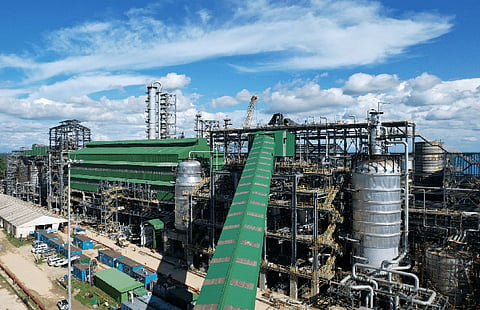
- Home
- Live Blog
- Breaking News
- Top Headlines
- Cities
- NE News
- Sentinel Media
- Sports
- Education
- Jobs

A correspondent
BOKAKHAT: Established on the basis of the historic Assam Accord, Numaligarh Refinery has been able to generate new hopes. The country’s first bamboo-based ethanol project has already been commissioned at Numaligarh Refinery.
Constructed with an expenditure of around Rs 5,000 crore, the ethanol project at Numaligarh Refinery will be inaugurated tomorrow by Prime Minister Narendra Modi during his visit to Numaligarh. The refinery authorities have undertaken massive preparations to welcome the Prime Minister. After landing at the newly built helipad, the Prime Minister will travel by car to the Bio-Refinery project site to inaugurate the project. Later, he will participate in a massive public meeting at the tanker stand on National Highway 39.
The bamboo-based bio-ethanol project at Numaligarh is a joint venture of Numaligarh Refinery and Finland-based Chempolis Oy with equal shareholding. This is the first such project in India. NRL has also planned to distribute around 6 million bamboo saplings among farmers. On the day of the Bio-Refinery’s inauguration, Prime Minister Narendra Modi will also lay the foundation stone for the Rs 7,200 crore Polypropylene Project to be set up at Numaligarh Refinery.
The Bio-Refinery project, set up for 2G ethanol production from bamboo biomass, has been implemented through a joint venture company with NRL as the lead partner. A successful trial run of the refinery was conducted in December 2024, which successfully established the process of ethanol production from bamboo.
This project, with an annual ethanol production capacity of 49,000 metric tonnes, will consume about 300,000 metric tonnes of bamboo every year, along with producing chemical by-products. The refinery will also be able to produce around 50,000 tonnes of ethanol annually, along with 18,000 tonnes of furfural and 11,000 tonnes of acetic acid. Additionally, the refinery will generate 5 MW of green power.
The refinery will procure bamboo worth around Rs 150–200 crore annually as raw material, bringing a major transformation to Assam’s bamboo farmers as well as the state’s rural economy. For the project, a 20 MW captive power generation unit will also be set up.
The Bio-Refinery is mainly designed to produce 49 kilo tonnes of ethanol annually. The raw material supply chain has been divided into four major categories: bamboo farmers, skilled harvesters and interim transporters, local entrepreneurs (as pre-processing units and regional warehouses), and bamboo chip transporters. All stakeholders, including bamboo farmers, will receive payments directly through electronic bank transfer. It is reported that this Bio-Refinery’s supply chain will benefit around 30,000 rural households. The refinery authorities have also launched a special scheme for bamboo plantation. The project has opened doors of opportunity for farmers and unemployed youth across rural Assam.
For this project, ABRPL (Assam Bio Refinery Private Limited) signed an agreement with the government-owned PFC (Power Finance Corporation), under which a loan of Rs 3,037.50 crore was provided. The plant will use dry bamboo as feedstock, with an annual requirement of 3 million tonnes. It will also produce 2G bio-ethanol and other by-products such as furfuryl alcohol, acetic acid, and liquid carbon dioxide, along with a 24 MW bio-coal-based power plant.
This joint venture includes three promoters: Numaligarh Refinery Limited and two Finnish companies, Fortum and Chempolis. Initially, in 2018, the project was estimated to cost Rs 2,000 crore, but due to delays, the expenditure has now escalated to nearly Rs 5,000 crore. Hence, there is a concern whether this Bio-Refinery will prove profitable in the long run.
Public sector oil companies have already set up 2G ethanol bio-refineries at Panipat (Haryana), Bathinda (Punjab), Numaligarh (Assam), and Bargarh (Odisha).
A bio-refinery is a facility that converts biomass into energy and other useful chemical by-products. According to the International Energy Agency, 2G bio-refineries could save foreign exchange of about Rs 55 crore annually by reducing imports, while also saving around Rs 600 crore annually spent on fuel imports.
Also Read: Numaligarh Refinery Limited (NRL) Xahitya Xabha celebrates Sudhakantha’s birthday
Also Watch: